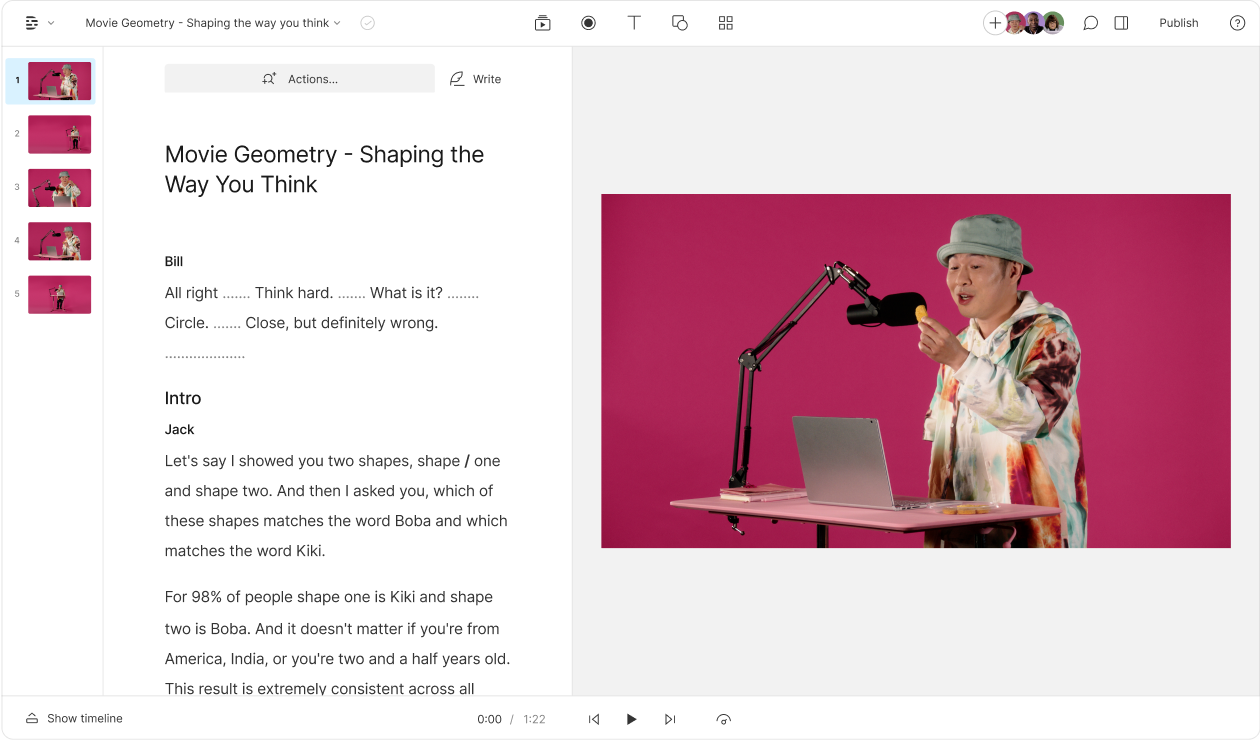What type of content do you primarily create?




Naming your podcast might be one of the most important steps to starting one. It’s the thing people see first and it’ll likely be with you as long as the show exists. As a result, it can be really hard to do right. In this article, I’m going to help you think about how to do it right.
Before we start, a disclaimer: this article is not going to give you the title of your podcast. By the time you finish reading these 1,000 words or so, a bolt of lightning won’t hit you from above to give you the smartest, funniest, catchiest, wittiest title. Honestly, that title might not even exist. Or even worse, a different show might have that title already.
I’m tempering your expectations because the best title of a podcast is the title you settle on, the one you’re happy with, and the one that checks off the most, but probably not all, of the boxes. What you will take away by the end of this article is how to focus your attention and brainstorm the show that works for you.
What do people know before they listen?
When you count the number of clicks it takes to get to the content you want to consume, podcasting is one of the most difficult digital mediums to access. It takes one click to like an Instagram post, maybe two clicks to watch a YouTube video or a TikTok. But if someone sends you a podcast, it might take three, four, or five clicks to go to your podcast player of choice, find an episode, and hit play. Four clicks is an eternity on the Internet, so making sure your podcast metadata is right is your first line of defense.
When I mean metadata, I’m talking about the information you get about a show before you listen. That’s your show's title, description, podcast art, episode titles, topic categories, and more. Because of the relatively big commitment that three-to-four-click journey poses to potential listeners, the metadata has to communicate information, tone, and genre as quickly as possible. And the title is the face of that operation.
All of that is to say: it is much more important to have a clear and concise title than it is to have a witty or punny title.
The three pillars of titling your show
I have produced 15 podcasts and I have been involved in the titling process for all of them. Some of them took weeks to settle on, and some of them were my placeholder names when I was creating a document. I can tell you that ultimately, a podcast title needs to answer YES to these three questions:
- Is it easy to hear?
- Is it easy to spell?
- Does it tell you what the show is about?
The first two are common-sense checks to hedge against too cute or too punny. If there are too many homophones or the pun only makes sense written out, Question One rules it out. The opposite is true for Question Two; if the written title is so clunky or needs so many dashes to properly execute, then it won’t work.
The third question is the guiding light of an effective title. The title must make sense on its own without any other context, as it will probably have to do that the most out of all your other metadata. Someone will ask you, “Oh what’s your podcast called?” and by saying your title, they should hopefully understand the genre, topic, and tone of your show as well.

Here’s what I mean: If you told someone the name of your podcast was “Wine and Crime,” you’d know a lot immediately. It’s a true crime podcast, you’re drinking so you’re loose and fun with it, and it would probably fall into the Women Drinking and Talking About Dark Topics genre. If you told someone the name of your podcast was, “Idol Talk,” I would be lost. Is it “idle” or “idol?” Is this show about Survivor, Billy Idol, or the Second Commandment? Is your show idle chit-chat about these topics? Because that’s a turn-off to me.
Try these title structures
Feeling stuck? Try these formats of great show titles to get your brain going.
- Ask a question: One of my favorite podcast titles is Nicole Byer’s Why Won’t You Date Me? It says exactly what the show is about! By asking the essential question of your podcast first and foremost, then everyone is on the same page. You better try to answer those questions in your show, though!
- Give us a full thesis: In the same vein, laying out the premise as concisely as possible is a perfect way to get that across. The first show I saw do this was the seminal reconsideration show You’re Wrong About… It doesn’t have to end with punctuation though; a short sentence does the trick. Consider the title of the tech-critical show Tech Won’t Save Us or the highly researched sports show from reporter Pable Torre Pablo Torre Finds Out.
- It is what it says on the tin: Maybe I’m used to this from all the sports podcasts I listen to, but I love a show that says what it is. A lot of networks or media companies have their own basketball or fantasy football show, so they need to not only communicate what the show is about but that it comes from their company. Enter a titling system exemplified by the Ringer: The Ringer NBA Show, The Ringer Gambling Show, The Ringer Fantasy Football Show, and more.

Double-check everything
Before you hit publish, make sure you check your work.
- Did you say your title out loud? Better yet, did you say it to someone else? Even better yet, did you say it to someone who doesn’t really listen to podcasts?
- Did you see if someone else has the show title already? It isn’t good enough just to Google it, make sure to check “(Title) + Podcast” or “Title + YouTube.” And it’s not just about the title itself, you’re competing for legible and easy social media handles and website URLs. Luckily, you can use Namechk to do all of that quickly.
- Are you doing the same thing that everyone else in your genre does? This isn’t about copying your colleagues in the same genre space as you, it’s about falling into the same naming conventions as they do. Podcasting is about niche community, and those niche communities will have low-hanging jokes and puns that will get grabbed first. Like everything else in podcasting, you need to immerse yourself in your genre’s content to make sure you’re doing something original and unique.























%201.svg)





